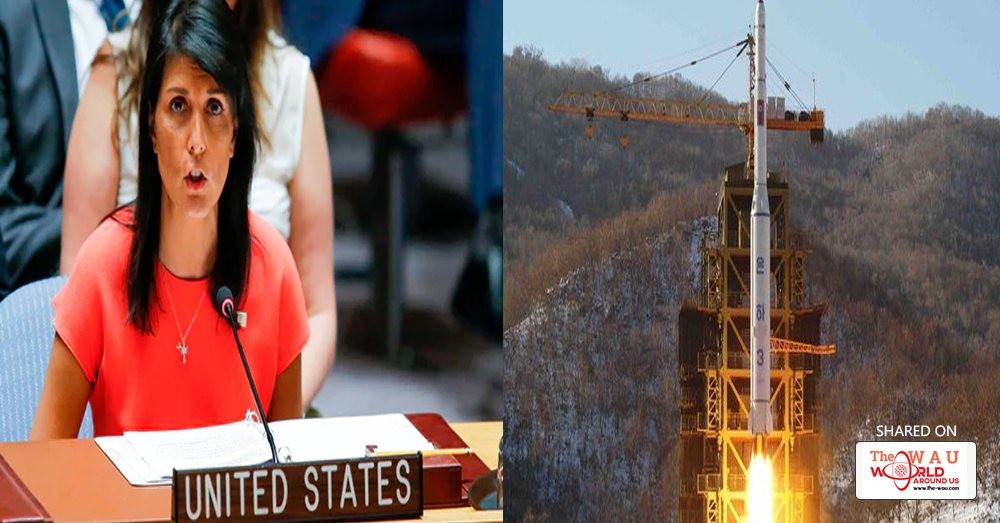The situation on the Korean peninsula is entering “a very critical phase”, China has warned after new United Nations sanctions targeting Pyongyang were announced following its recent intercontinental ballistic missile test.
Speaking in Manila before a regional security summit, China’s foreign minister, Wang Yi, said the sanctions had been designed “to efficiently, or more efficiently, block North Korea’s nuclear missile development”.
“Sanctions are needed but not the ultimate goal,” Wang added. “The purpose is to pull the peninsula nuclear issue back to the negotiating table, and to seek a final solution to realise the peninsula denuclearisation and long-term stability through negotiations.”
“After the resolution is passed, the situation on the peninsula will enter a very critical phase,” Wang warned, according to China’s state broadcaster CGTN. “We urge all parties to judge and act with responsibility in order to prevent tensions from escalating.”
Wang met his North Korean counterpart, Ri Yong Ho, on Sunday who reportedly smiled continuously as he shook the Chinese official’s hand. According to Reuters, journalists were not given access to a meeting between the two men.
On Saturday Nikki Haley, the US ambassador to the United Nations, said “further action is required” against North Korea.
Earlier, National Security Adviser HR McMaster said Donald Trump had been “deeply briefed” on recent missile tests carried out by Pyongyang, and said the US would do “everything we can to to pressure this regime” while seeking to avoid “a very costly war”.
Haley spoke to the UN security council after the 15-member body imposed the new sanctions against North Korea, in response to its two long-range missiles tests in July.
“We should not fool ourselves into thinking we have solved the problem,” Haley said. “Not even close. The North Korean threat has not left us, it is rapidly growing more dangerous. Further action is required. The United States is taking and will continue to take prudent defensive measures to protect ourselves and our allies.”
Washington would continue annual military exercises with South Korea, Haley said.
The UN-approved sanctions include a ban on exports worth more than $1bn, a huge bite out of North Korea’s total exports, valued at $3bn last year. Countries are also banned from giving any additional permits to North Korean laborers – another source of money for the regime of Kim Jong-un – and all new joint ventures with North Korean companies and foreign investment in existing ones are banned.
Nine North Koreans, mainly officials or representatives of companies and banks, have been added to the UN sanctions blacklist, banning travel and freezing assets. An asset freeze has also been imposed on two companies and two banks.
The US-drafted sanctions were negotiated with China, North Korea’s chief ally, and are aimed at making Pyongyang return to negotiations on its nuclear and missile programs.
“All of this ICBM and nuclear irresponsibility has to stop,” Haley told reporters as she headed to the council to vote. Later, she told council members the sanctions represented “the single largest economic package ever levelled against the North Korean regime”.
Earlier, China called for a halt to the deployment of the US Thaad anti-missile defense system in South Korea and for relevant equipment to be dismantled, UN ambassador Liu Jieyi told the security council.
“The deployment of the Thaad system will not bring a solution to the issue of [North Korea’s] nuclear testing and missile launches,” Liu said, also urging North Korea to “cease taking actions that might further escalate tensions”.
McMaster spoke early on Saturday, in an interview with MSNBC host Hugh Hewitt. As it was “impossible to overstate the danger” posed by North Korea, he said, the administration was keeping on the table all options including a targeted military strike. But McMaster acknowledged that any war “would be a very costly war, in terms of in terms of the suffering of mainly the South Korean people”.
“So what we have to do is is everything we can to to pressure this regime,” he said, “to pressure Kim Jong-un and those around him such that they conclude it is in their interest to denuclearize.”
Share This Post















